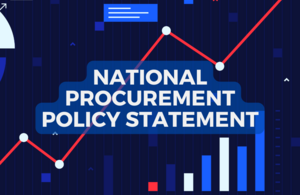The Procurement Act – Are You Ready To Win Government Contracts?
As part of broader reforms aimed at lowering barriers to SMEs obtaining public sector contracts, the UK government will introduce the Procurement Act on 24...
Read Full Article
Thousands of small businesses are to benefit from new government buying rules which aim to provide opportunities to win valuable business with public sector organisations.
Complicated government buying processes will be simplified to make it easier for small businesses to win contracts.
The aim is to bring jobs and growth to local areas and across the UK as the government enacts its Plan for Change. Alongside measures for small business, companies that win public sector contracts will be told to advertise vacancies at local job centres.
Spread the love
The measures announced by the government came the day before Valentine’s Day 2025. They aim to speed up and simplify procurement processes in the public sector, where £400 billion is spent each year on essential goods and services.
The changes outlined include proposals for a major shake-up of spending rules, with local councils able to reserve contracts for small businesses to maximise spend within their area and help boost local economies.
Minister speaks
Georgia Gould, Parliamentary Secretary at the Cabinet Office, says: “Businesses tell me that the current system isn’t working. It is slow, complicated and too often means small businesses in this country are shut out of public sector contracts.
“These measures will change that, giving them greater opportunity to access the £400 billion spent on public procurement every year, investing in home grown talent and driving innovation and growth.
“This new policy statement sets out our vision for how procurement can put this country back into the service of working people and deliver our Plan for Change – by making sure the public sector is committed to growing the economy and empowering our communities with innovation and opportunity.”
Complicated and off-putting
Current processes require ‘Social Value’ measures on contracts, which put requirements on businesses to help bring forward positive change in communities and the country as a whole. However, there are currently multiple different approaches used across the public sector and potentially many different criteria, confusing business and making it harder to ensure the commitments made are actually delivered.
“The government will be updating and streamlining the system used by all central government departments and their agencies to align it with the government’s missions,” says Gould. “This will make it simpler to use, giving small businesses a better chance when bidding for contracts and will make sure companies who profit from government work give back to the community.”
Small Business Minister Gareth Thomas says:
“For too long small businesses have been stuck on the sidelines of the procurement process with complicated bureaucracy and a confusing system. These measures will mean small firms can more easily offer their expertise to key projects both locally and nationally, helping SMEs to scale up, securing jobs and creating opportunities across the country.”
National Procurement Policy Statement
Alongside the NPPS, a range of measures to support its delivery and make savings across government are also being introduced. This includes the development of a new AI tool for commercial teams across government to cut bureaucracy wherever possible – such as to simplify redacting contracts and quality assurance of procurement documents.
Register of Frameworks
The National Audit Office recently estimated there are between 8,000 and 21,000 frameworks available to public sector buyers through external third-party organisations. These agreements are often not transparent, with hidden fees and charges, racking up the cost of common goods and services. A new Register of Framework agreements will be produced to shine a light on those rip-off frameworks from third party providers that are profiting off local councils and NHS.
The government will also be consulting on more reforms including a requirement for large contracting authorities to publish their three-year targets for small business and social enterprise spend and report on this annually – as well as the exclusion of suppliers from contracts worth more than £5million if they don’t complete prompt payments of invoices.
Picture: The National Procurement Policy Statement has been made.
Article written by Cathryn Ellis
21st February 2025